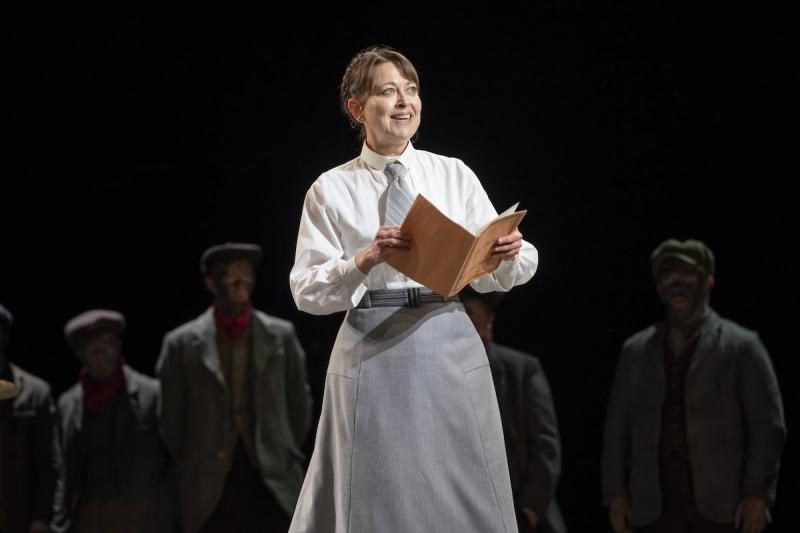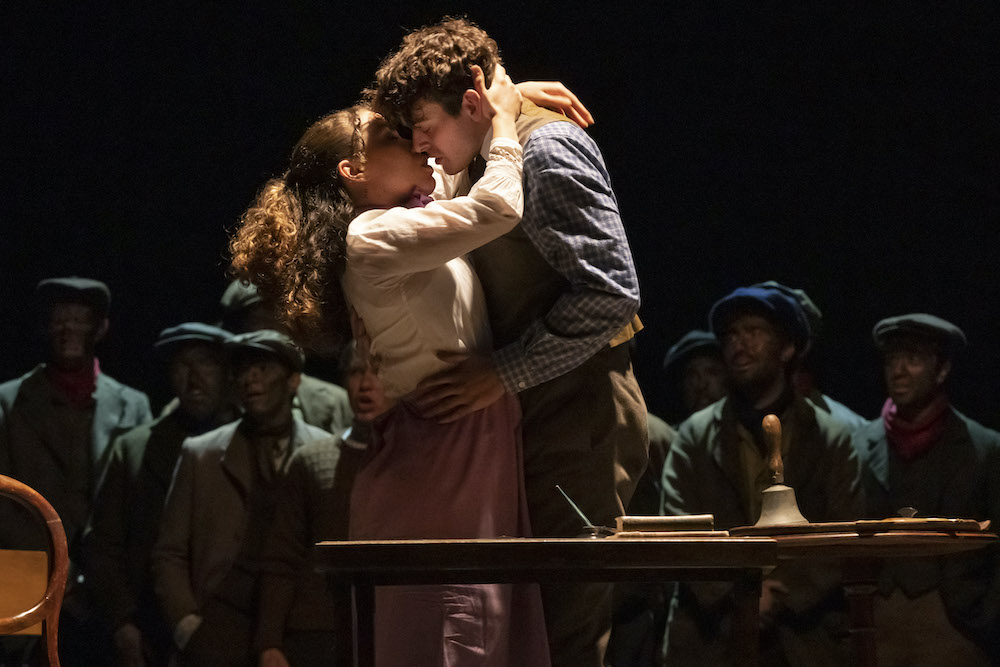The Corn Is Green, National Theatre review – Nicola Walker teaches a life lesson | reviews, news & interviews
The Corn Is Green, National Theatre review – Nicola Walker teaches a life lesson
The Corn Is Green, National Theatre review – Nicola Walker teaches a life lesson
Dominic Cooke’s imaginative revival improves on Emlyn Williams’s 1938 play

Let’s talk repertoire. Over the past decade the range of British plays, especially those from the 17th, 18th and 19th centuries, has shrunk in state-subsidized theatres. You can no longer easily see work by Shakespeare’s contemporaries, Restoration rakes or Georgian comics. George Bernard Shaw is in hiding. English 19th-century problem plays are invisible.
The abandonment of older genres, of difficult plays, is just one symptom of subsidized theatre’s craven surrender to populism. Even 20th-century drama is under threat. So can the National Theatre buck this trend with this rediscovery of The Corn Is Green, and some help from its star, Nicola Walker?
Well yes, and no. The first London revival in 35 years, this semi-autobiographical drama by the Welsh actor and playwright Emlyn Williams was first produced in 1938. It is set in Glansarno, a coal-mining village in the remote countryside in Wales, where most of the workers are Welsh-speaking and illiterate. It is the late 19th century. So when English do-gooder and New Woman Miss Moffat (Walker) arrives to set up a school for local children she must first convince Miss Ronberry, a gentlewoman spinster, and Mr Jones, a gloomy Welsh chapel-goer, to help her, especially as the local Squire – who owns most of the land – isn’t too keen on educating the miners. If they can read, won’t they rebel?
As obstacles pile up, Moffat is discouraged, until she reads an essay by Morgan Evans, who is both a bad boy in class and a youngster with intellectual potential. As he responds to her teaching, he finds himself alienated from his fellow miners and increasingly antagonistic to Moffat’s control and her desire for him to go to university. Being headstrong and passionate, he reacts to this conflict by drinking and being attracted to Bessie, the teenage daughter of Mrs Watty, Moffat’s cockney housekeeper. The results of this brief romance threaten to upset all of Moffat’s plans for her prodigy.
Although the play is a heartfelt tribute to Miss Cooke, Williams’s own teacher, it is written with an uneasy mixture of jolly humour and deeply felt idealism. Clearly, the playwright is arguing that one inspiring teacher can make a difference to the fate of under-privileged youngsters, but at the same time his view of the society which he himself escaped from – rural Wales – is less than flattering. The most appealing aspect of Williams’s plotting is the fact that it is his story’s women — not only Moffat, but also Watty and Ronberry — that solve the problem called Bessie, while the men are either useless or easily manipulated.
 The main drama of the piece is the relationship between Moffat and Morgan, which swings between conflict and cooperation as the young man finds his voice and develops his intellectual skills. Although the final plot twist is psychologically unlikely, Williams delivers a great dialogue between teacher and pupil which is full of passionate humanism. Director Dominic Cooke pays tribute to the semi-autobiographical nature of the play by adding a framing device which shows the adult Williams deciding, in the midst of the distractions of jazz age London, to write his play.
The main drama of the piece is the relationship between Moffat and Morgan, which swings between conflict and cooperation as the young man finds his voice and develops his intellectual skills. Although the final plot twist is psychologically unlikely, Williams delivers a great dialogue between teacher and pupil which is full of passionate humanism. Director Dominic Cooke pays tribute to the semi-autobiographical nature of the play by adding a framing device which shows the adult Williams deciding, in the midst of the distractions of jazz age London, to write his play.
Despite some tedious banalities (do we really need to see Williams sit down to tap out his play on a typewriter?) this framing device adds a lot of humour to the opening scenes, as Cooke’s Williams speaks the stage directions, manoeuvres his characters around the stage and, in one coup de théâtre, changes the direction of the plot. Sound effects stand in for stage props; narrative for exposition. Underlining the theatricality of the play enables Cooke to contrast the bare stage of the playwright’s imagination at the start with the more naturalistic setting of later scenes as the tale develops. The framing device both adds to the original play, while also dare I say improving it, and at the same time draws attention to the shortcomings of Williams’s writing.
Cooke’s production, which is designed by ULTZ, is entertaining in its populist stress on feelgood comedy, and his cast are uniformly good. Walker, who usually specialises in various shades of agonized self-doubt, is smoother here, giving Moffat’s middle-class feminism a confident brio that generates immediate audience support. Whether incisive in her opinions, especially in her anger against the Squire, or tender in her regard for Morgan, her performance is always detailed and convincing. As the youngsters, Iwan Davies (Morgan) and Saffron Coomber (Bessie, pictured above) come across as agreeably gutsy, while the adults – Richard Lynch (Jones), Alice Orr-Ewing (Ronberry), Jo McInnes (Watty) and Rufus Wright (Squire) – offer good support. Gareth David-Lloyd’s broodingly thoughtful Williams is a delightful addtion.
A distinctive feature of the production is the small chorus of miners, whose songs are composed and arranged by Will Stuart, and lend a distinctly Welsh air to the show. At its centre is both an image of an inspirational teacher, a flawed but effective character, and a reminder of how class has always been central to British life and art. At the same time, the idea that learning Latin, Greek, Tudor history and Milton as a passport to a better life has a philanthropic Victorian feel. Yet these are images and themes that continue to have resonance in the present — the school you go to is still a good predictor of your career opportunities. But it’s a pity that this populist version makes more of a case for directorial rewriting than for the original play’s place in the repertory.
rating
Explore topics
Share this article
The future of Arts Journalism
You can stop theartsdesk.com closing!
We urgently need financing to survive. Our fundraising drive has thus far raised £49,000 but we need to reach £100,000 or we will be forced to close. Please contribute here: https://gofund.me/c3f6033d
And if you can forward this information to anyone who might assist, we’d be grateful.

Subscribe to theartsdesk.com
Thank you for continuing to read our work on theartsdesk.com. For unlimited access to every article in its entirety, including our archive of more than 15,000 pieces, we're asking for £5 per month or £40 per year. We feel it's a very good deal, and hope you do too.
To take a subscription now simply click here.
And if you're looking for that extra gift for a friend or family member, why not treat them to a theartsdesk.com gift subscription?
more Theatre
 Good Night, Oscar, Barbican review - sad story of a Hollywood great's meltdown, with a dazzling turn by Sean Hayes
Oscar Levant is an ideal subject to refresh the debate about media freedom
Good Night, Oscar, Barbican review - sad story of a Hollywood great's meltdown, with a dazzling turn by Sean Hayes
Oscar Levant is an ideal subject to refresh the debate about media freedom
 Edinburgh Fringe 2025 reviews - Monstering the Rocketman by Henry Naylor / Alex Berr
Tabloid excess in the 1980s; gallows humour in reflections on life and death
Edinburgh Fringe 2025 reviews - Monstering the Rocketman by Henry Naylor / Alex Berr
Tabloid excess in the 1980s; gallows humour in reflections on life and death
 Edinburgh Fringe 2025 reviews: Lost Lear / Consumed
Twists in the tail bring revelations in two fine shows at the Traverse Theatre
Edinburgh Fringe 2025 reviews: Lost Lear / Consumed
Twists in the tail bring revelations in two fine shows at the Traverse Theatre
 Make It Happen, Edinburgh International Festival 2025 review - tutting at naughtiness
James Graham's dazzling comedy-drama on the rise and fall of RBS fails to snarl
Make It Happen, Edinburgh International Festival 2025 review - tutting at naughtiness
James Graham's dazzling comedy-drama on the rise and fall of RBS fails to snarl
 Edinburgh Fringe 2025 reviews: I'm Ready To Talk Now / RIFT
An intimate one-to-one encounter and an examination of brotherly love at the Traverse Theatre
Edinburgh Fringe 2025 reviews: I'm Ready To Talk Now / RIFT
An intimate one-to-one encounter and an examination of brotherly love at the Traverse Theatre
 Top Hat, Chichester Festival Theatre review - top spectacle but book tails off
Glitz and glamour in revived dance show based on Fred and Ginger's movie
Top Hat, Chichester Festival Theatre review - top spectacle but book tails off
Glitz and glamour in revived dance show based on Fred and Ginger's movie
 Edinburgh Fringe 2025 reviews: Alright Sunshine / K Mak at the Planetarium / PAINKILLERS
Three early Fringe theatre shows offer blissed-out beats, identity questions and powerful drama
Edinburgh Fringe 2025 reviews: Alright Sunshine / K Mak at the Planetarium / PAINKILLERS
Three early Fringe theatre shows offer blissed-out beats, identity questions and powerful drama
 The Daughter of Time, Charing Cross Theatre review - unfocused version of novel that cleared Richard III
The writer did impressive research but shouldn't have fleshed out Josephine Tey’s story
The Daughter of Time, Charing Cross Theatre review - unfocused version of novel that cleared Richard III
The writer did impressive research but shouldn't have fleshed out Josephine Tey’s story
 Evita, London Palladium review - even more thrilling the second time round
Andrew Lloyd Webber's best musical gets a brave, biting makeover for the modern age
Evita, London Palladium review - even more thrilling the second time round
Andrew Lloyd Webber's best musical gets a brave, biting makeover for the modern age
 Maiden Voyage, Southwark Playhouse review - new musical runs aground
Pleasant tunes well sung and a good story, but not a good show
Maiden Voyage, Southwark Playhouse review - new musical runs aground
Pleasant tunes well sung and a good story, but not a good show
 The Winter's Tale, RSC, Stratford review - problem play proves problematic
Strong women have the last laugh, but the play's bizarre structure overwhelms everything
The Winter's Tale, RSC, Stratford review - problem play proves problematic
Strong women have the last laugh, but the play's bizarre structure overwhelms everything
 Brixton Calling, Southwark Playhouse review - life-affirming entertainment, both then and now
Nostalgic, but the message is bang up to date
Brixton Calling, Southwark Playhouse review - life-affirming entertainment, both then and now
Nostalgic, but the message is bang up to date

Add comment